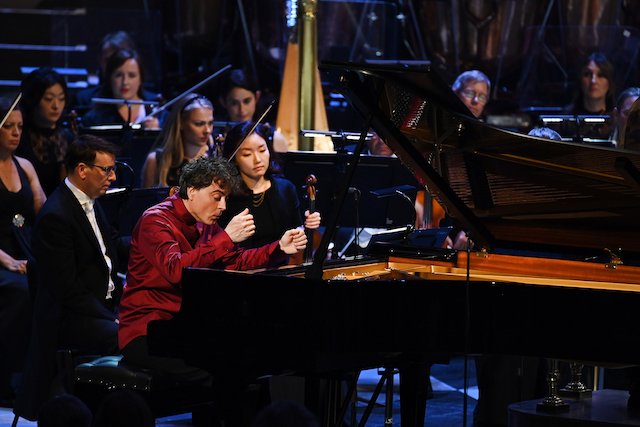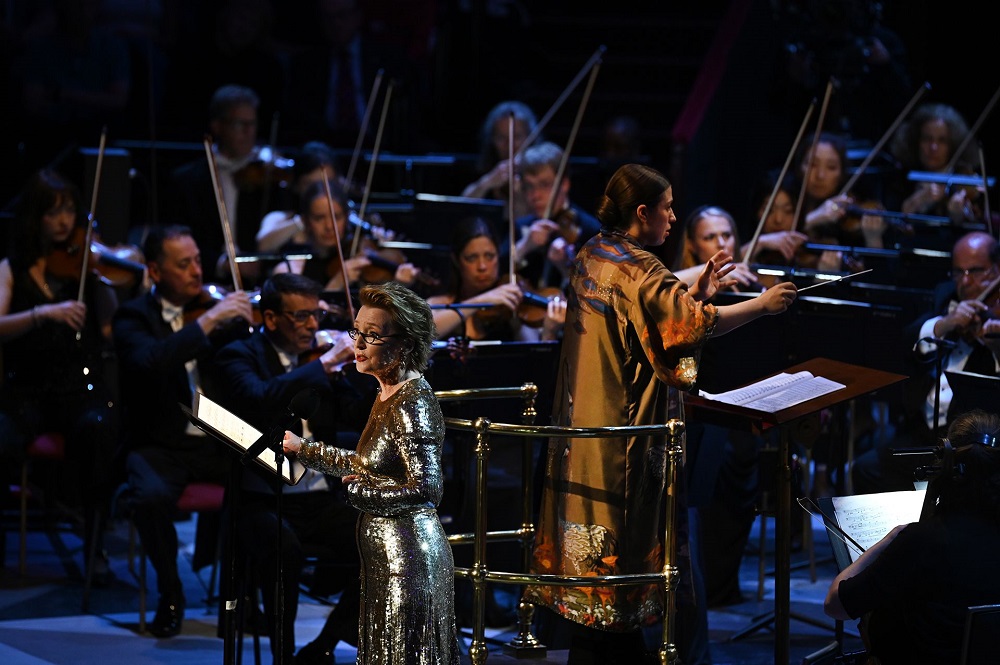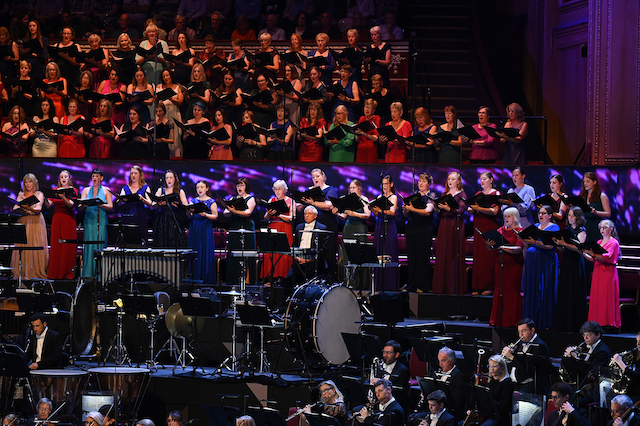First Night of the Proms, BBCSO, Stasevska review - fire and elan mark an evening celebrating freedom | reviews, news & interviews
First Night of the Proms, BBCSO, Stasevska review - fire and elan mark an evening celebrating freedom
First Night of the Proms, BBCSO, Stasevska review - fire and elan mark an evening celebrating freedom
A blazing launch to the biggest music festival in the world
Even before the Just Stop Oil protesters hit the stage after the interval, this was destined to be one of the most politically charged Proms the Royal Albert Hall has witnessed for a while. The rousing cheer that greeted the BBC Singers was hopefully all the beleaguered BBC bosses needed to realise – after the ill-advised attempt to abolish them in March – what a key part of our music culture they remain today.
On top of this there was the programme, featuring two nationalist Nordic composers – one especially famed for his anti-Russian stance – and a contemporary Ukrainian, presided over by a Kyiv-born Finnish-national conductor. For some people the biggest surprise may have been that, once the Just Stop Oil protesters had been hustled off, Putin didn’t invade the stage immediately after.
Dalia Stasevska, Principal Guest Conductor of the BBC Symphony Orchestra, brought fire and elan to the action, taking the players from spun-glass delicacy to vigorous bellicosity. The opening number was Sibelius’s Finlandia, the tone poem written in 1899 that became a symbol of Finnish resistance to the Russian occupation lasting from 1809 to 1917. After the sinister call to arms of the opening brass section, the orchestra delivered a lyrical evocation of a landscape and people under threat before the sonorous agitation of the cellos heralded the emotional and political uprising. The hymn at the end, now an international symbol of dignified resistance, was exquisitely performed by the BBC Singers and BBC Symphony Chorus – the beatific restraint of the sopranos and altos underscored by the resolute gravitas of the tenors and basses.
The composer Bohdana Frolyak graduated from Lviv Conservatory in 1991 and still lives there. Stasevska was introduced to her work by her bass-guitarist husband, Lauri Porra, and the result was the first of this year’s Proms commissions, Let There Be Light. 
The centrepiece of the evening was Grieg’s Piano Concerto, here performed by Paul Lewis (pictured above), a pianist particularly acclaimed for his recordings of Beethoven and Schubert – no surprise, you might say, given that one of his teachers was Alfred Brendel. This was a fascinating performance, in which Lewis chose to tone down the thunder to deliver an interpretation of crystalline brilliance.
In a more intimate venue this might have worked superbly; in the Royal Albert Hall it felt as if it was lacking something. Though Lewis’s superb technical mastery was never in any doubt – the runs had the vividness of dancing fireflies and there was a real sense of the different textures in the music as he shifted between gossamer lightness and elegant muscularity. Stasevska deftly balanced the orchestral passages so that there was a sense both of power and sensitivity to this reflective, lyrical interpretation. The communication and empathy between her and Lewis was palpable throughout and there was a real sense of triumph at the ending.  After the interval and the brief onstage appearance of the Just Stop Oil protesters – who received both boos and applause from the audience – the BBC Symphony Orchestra, the BBC Singers and the BBC Symphony Chorus (pictured below) performed Sibelius’s Snöfrid. This musical setting of a poem by the Swedish writer Viktor Rydberg – with its spoken part stirringly translated by Edward Kemp – had been due to be performed at the Last Night of the Proms in 2022 but was cancelled because of the death of the Queen.
After the interval and the brief onstage appearance of the Just Stop Oil protesters – who received both boos and applause from the audience – the BBC Symphony Orchestra, the BBC Singers and the BBC Symphony Chorus (pictured below) performed Sibelius’s Snöfrid. This musical setting of a poem by the Swedish writer Viktor Rydberg – with its spoken part stirringly translated by Edward Kemp – had been due to be performed at the Last Night of the Proms in 2022 but was cancelled because of the death of the Queen.
At the start of the performance there was a feeling of swirling, cyclonic energy, quickly succeeded by the chorale. Like Finlandia, this is essentially a summons to fight for freedom, here enshrined in a story in which the female protagonist Snöfrid calls on the warrior Gunnar. While the choir sang in Swedish, describing the temptations that could lure him from battle, Leslie Manville – dressed in a shimmering gold dress (pictured above)– delivered Snöfrid’s words in English. "Better to battle, poor but with honour, Than doze like the dragon hoarding his riches." At another point she declared, "Choose me, you choose the tempest." It was moment that was as riveting as it was powerful, adding to the sense of rebellious defiance that had built through the evening. 
It topped off a conceptually riveting evening, with the right amount of light and dark to keep everyone stimulated and happy. Stasevska – who over the last year has driven lorries from Finland to Ukraine with supplies for the war-torn nation – was in every sense the concert’s star, amplifying the sense of bravery and defiance that made it a memorable first night.
rating
Explore topics
Share this article
The future of Arts Journalism
You can stop theartsdesk.com closing!
We urgently need financing to survive. Our fundraising drive has thus far raised £49,000 but we need to reach £100,000 or we will be forced to close. Please contribute here: https://gofund.me/c3f6033d
And if you can forward this information to anyone who might assist, we’d be grateful.

Subscribe to theartsdesk.com
Thank you for continuing to read our work on theartsdesk.com. For unlimited access to every article in its entirety, including our archive of more than 15,000 pieces, we're asking for £5 per month or £40 per year. We feel it's a very good deal, and hope you do too.
To take a subscription now simply click here.
And if you're looking for that extra gift for a friend or family member, why not treat them to a theartsdesk.com gift subscription?
more Classical music
 Hallé John Adams festival, Bridgewater Hall / RNCM, Manchester review - standing ovations for today's music
From 1980 to 2025 with the West Coast’s pied piper and his eager following
Hallé John Adams festival, Bridgewater Hall / RNCM, Manchester review - standing ovations for today's music
From 1980 to 2025 with the West Coast’s pied piper and his eager following
 Kaploukhii, Greenwich Chamber Orchestra, Cutts, St James's Piccadilly review - promising young pianist
A robust and assertive Beethoven concerto suggests a player to follow
Kaploukhii, Greenwich Chamber Orchestra, Cutts, St James's Piccadilly review - promising young pianist
A robust and assertive Beethoven concerto suggests a player to follow
 Robin Holloway: Music's Odyssey review - lessons in composition
Broad and idiosyncratic survey of classical music is insightful but slightly indigestible
Robin Holloway: Music's Odyssey review - lessons in composition
Broad and idiosyncratic survey of classical music is insightful but slightly indigestible
 Classical CDs: Wolf-pelts, clowns and social realism
British ballet scores, 19th century cello works and contemporary piano etudes
Classical CDs: Wolf-pelts, clowns and social realism
British ballet scores, 19th century cello works and contemporary piano etudes
 Bizet in 150th anniversary year: rich and rare French offerings from Palazzetto Bru Zane
Specialists in French romantic music unveil a treasure trove both live and on disc
Bizet in 150th anniversary year: rich and rare French offerings from Palazzetto Bru Zane
Specialists in French romantic music unveil a treasure trove both live and on disc
 Scottish Chamber Orchestra, Ibragimova, Queen’s Hall, Edinburgh review - rarities, novelties and drumrolls
A pity the SCO didn't pick a better showcase for a shining guest artist
Scottish Chamber Orchestra, Ibragimova, Queen’s Hall, Edinburgh review - rarities, novelties and drumrolls
A pity the SCO didn't pick a better showcase for a shining guest artist
 Kilsby, Parkes, Sinfonia of London, Wilson, Barbican review - string things zing and sing in expert hands
British masterpieces for strings plus other-worldly tenor and horn - and a muscular rarity
Kilsby, Parkes, Sinfonia of London, Wilson, Barbican review - string things zing and sing in expert hands
British masterpieces for strings plus other-worldly tenor and horn - and a muscular rarity
 From Historical to Hip-Hop, Classically Black Music Festival, Kings Place review - a cluster of impressive stars for the future
From quasi-Mozartian elegance to the gritty humour of a kitchen inspection
From Historical to Hip-Hop, Classically Black Music Festival, Kings Place review - a cluster of impressive stars for the future
From quasi-Mozartian elegance to the gritty humour of a kitchen inspection
 Shibe, LSO, Adès, Barbican review - gaudy and glorious new music alongside serene Sibelius
Adès’s passion makes persuasive case for the music he loves, both new and old
Shibe, LSO, Adès, Barbican review - gaudy and glorious new music alongside serene Sibelius
Adès’s passion makes persuasive case for the music he loves, both new and old
 Anja Mittermüller, Richard Fu, Wigmore Hall review - a glorious hall debut
The Austrian mezzo shines - at the age of 22
Anja Mittermüller, Richard Fu, Wigmore Hall review - a glorious hall debut
The Austrian mezzo shines - at the age of 22
 First Person: clarinettist Oliver Pashley on the new horizons of The Hermes Experiment's latest album
Compositions by members of this unusual quartet feature for the first time
First Person: clarinettist Oliver Pashley on the new horizons of The Hermes Experiment's latest album
Compositions by members of this unusual quartet feature for the first time

Add comment